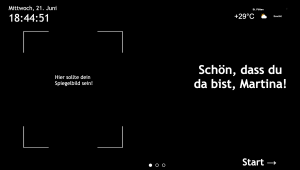Development and evaluation of the usability of a smart mirror prototype to support speech therapy for patients with Parkinson’s disease
Aim and Research Question(s)
The purpose of this thesis is the development of a Smart Mirror Prototype "mirReha - Usability" to support the speech therapy of patients with Parkinson´s disease. Furthermore, the usability of the Smart Mirror Prototype is evaluated. The main research questions are: Question I: How do health professionals evaluate the usability of the smart mirror prototype “mirReha - Usability”?, Question II: How do people in the target group age of Parkinson´s disease evaluate the usability of the smart mirror prototype “mirReha - Usability”? and Question III: Does the assessment of the usability of the smart mirror prototype "mirReha - Usability" differ between health professionals and people of target group age?
Background
Parkinson's disease affects millions of people worldwide, and its prevalence is increasing due to the aging population. Speech impairments, such as dysarthria or aphasia, are a common symptom and increase the risk of social exclusion. Speech therapy is crucial for affected individuals and frequent, repetitive exercises can significantly improve these impairments. Smart mirrors could provide a unique solution by enabling interactive, personalized exercises with real-time feedback.
Methods
The smart mirror prototype comprises hardware components, including a computer display, spy-mirror glass, and a connected camera. The software is developed using HTML, CSS, and JavaScript, with some exercises utilizing SparkAR for augmented reality and real-time feedback. The smart mirror prototype will be evaluated by two groups:
- Group 1: five healthcare professionals with a completed education in a health profession
- Group 2: six people without a diagnosed disease in the target group age (50 - 70 years)
The participants will test the smart mirror for 10 minutes. Following the test, participants will complete a questionnaire consisting of the System Usability Scale (SUS) and customized questions for the Smart Mirror. The questionnaire includes 26 questions and takes approximately 10-15 minutes to finish.
Results and Discussion
The evaluation results of the questionnaire are extremely positive, both from the healthcare professionals’ field and from people of the target group age, which is 50 to 70 years, who assessed the usability of the "mirReha - Usability". A detailed analysis of the data collected shows that the average score of the System Usability Scale (SUS) for healthcare professionals is 88.5 and from the individuals of the target group age 90.8, both indicating excellent usability.
 Figure 1: Start Page of the Smart Mirror Prototype
Figure 1: Start Page of the Smart Mirror Prototype
Conclusion
These results show that the Smart Mirror "mirReha - Usability" could be a promising assistance device for people with Parkinson's disease. Nevertheless, it is crucial to conduct further evaluations with the actual target group, namely patients with Parkinson's disease, to ensure its effectiveness and usability in a clinical setting.
References
Bianco, S. (2021), Frieg, H. (2017), Arjunan, S. P. (2022)
